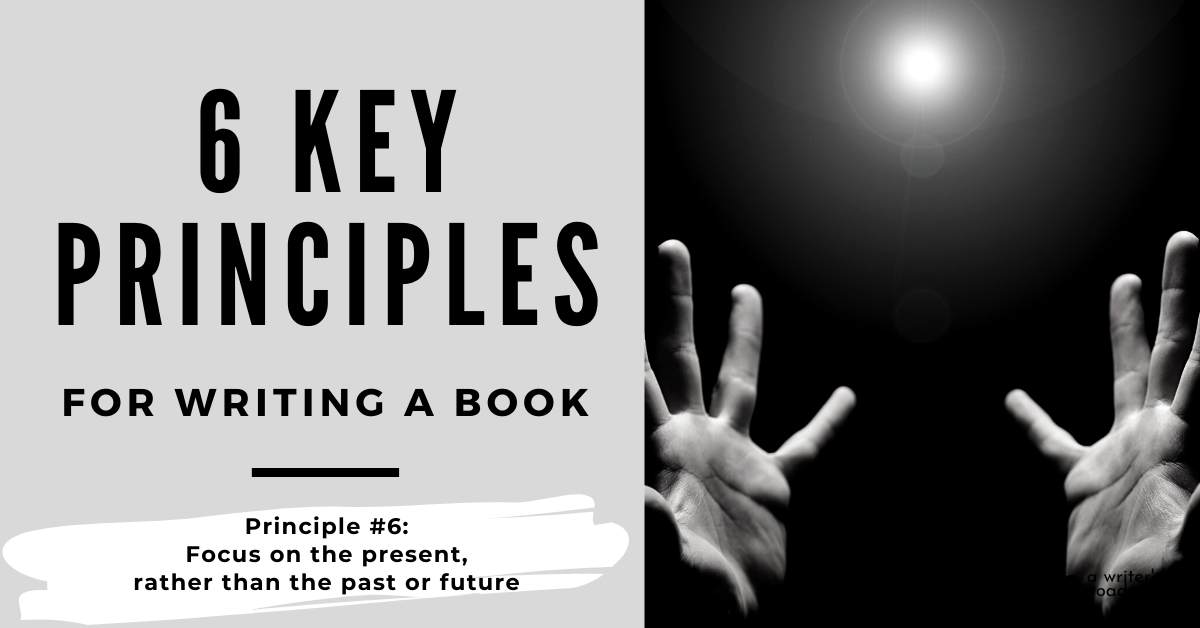- No single approach works for everyone
- The simplest and least invasive approach is frequently the best
- The solution and the problem are not necessarily related
- Change is happening all the time
- Focus on strengths and resources rather than weaknesses and deficits
- Focus on the present, rather than the past or future.
“The more we learn that each moment has its own intrinsic value, the easier it is for us to let ourselves just be in each moment, however it is manifesting. Then we recognize that where we are is where we are supposed to be.”
A.H. Almaas
Once when my daughter was worried about being called to the principal’s office in fourth grade, I suggested she pretend she’s writing a story and needs details about what the hallway outside the principal’s office looks like, and about what she’s feeling inside.
And that brings us to …
Principle #6: Focus on the present, rather than the past or future
What is that slippery thing called the present? It’s the best time of our lives. Have you ever “come to” from a reverie and realized that a flock of birds was flying to their roost, just at the moment you looked up?
Me too!
There is no substitute for the present. Many of us live time-bound lives, where we feel as if we’re on a continuum from past to future. But as Eckhart Tolle (who lives near my mom!) points out in just about every book he’s written, there is only ever the now.
Your past is made up of a whole bunch of nows. When they were happening, if you were unconsciously caught up in thinking about the past or the future, you weren’t getting the full flavor or import of that now.
The present is all we have
The mind skates around, no question. It’s like a kid in the backseat, asking “are we there yet?”
We’re always there, while at the same time we’re still heading somewhere and coming from something, at least in our own minds.
Half the job in writing is to stop coming and going, and just be in the moment of writing your stuff.
Funny story
Guess what; I’m writing a book. Another one…the same one again…who knows?
I’ve been procrastinating, yet I’m still making progress. I have written the first act, along with a bunch of extra scenes that I probably can’t use, but that were either fun or excruciating to write, depending on the scene. I have a general idea of the plot (beginning, middle, climax, maybe end).
But up until recently, the beginning was the only part I could actually see.
Until the other day, when I was thinking about the story and it suddenly got FAR MORE SPECIFIC. A great many details of character and plot presented themselves. The antagonist moved from being “the patriarchy” to a couple of specific dudes.
I was baffled at this breakthrough. What had I done to deserve it?
I was just sitting there being present with the story and the book. (This wasn’t really a choice, by the way. I’m in a writing group, we were meeting to write together, and I didn’t have anything else to work on.)
So, I ended up doing nothing except thinking about the story, and it gelled.
Whatever it takes
You can create the conditions for yourself to be present with a book.
It’s probably easier if you already meditate or throw pots or play sports or have sex or do anything else that requires you to be fully present.
But in lieu of a practiced ability to get present in the now, why not create the conditions for it?
Personally, I’m thinking about signing up for more things that will replicate what happened with my writing group. Once a week won’t get that draft written this year.
I’m looking at Shut Up & Write, which has free events where people write together in the comfort of their own homes. I believe there are also in-person events in some cities, but that seems like extra work.
I’m telling myself I should just write the book without needing any of this, like I did my previous novels. But “should” has no place in the writing life.

